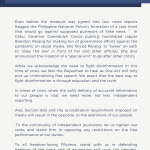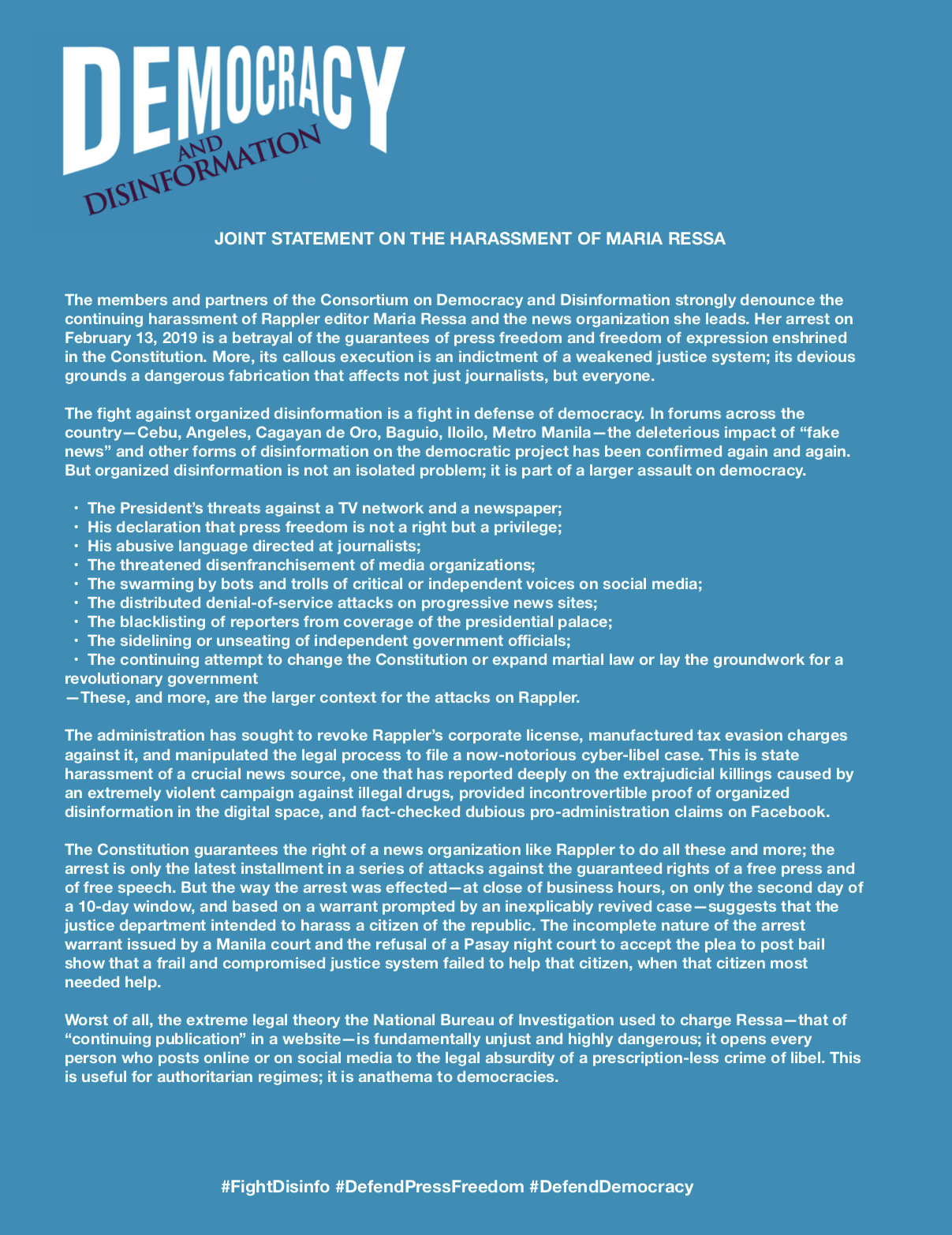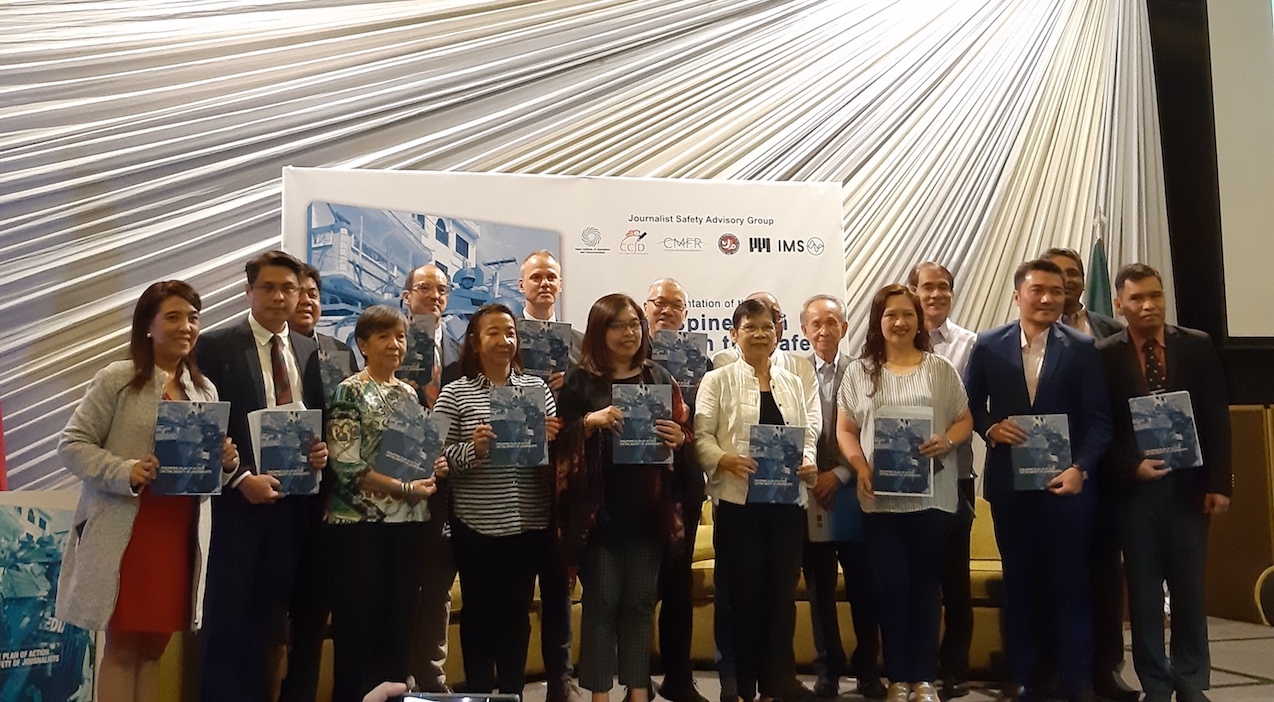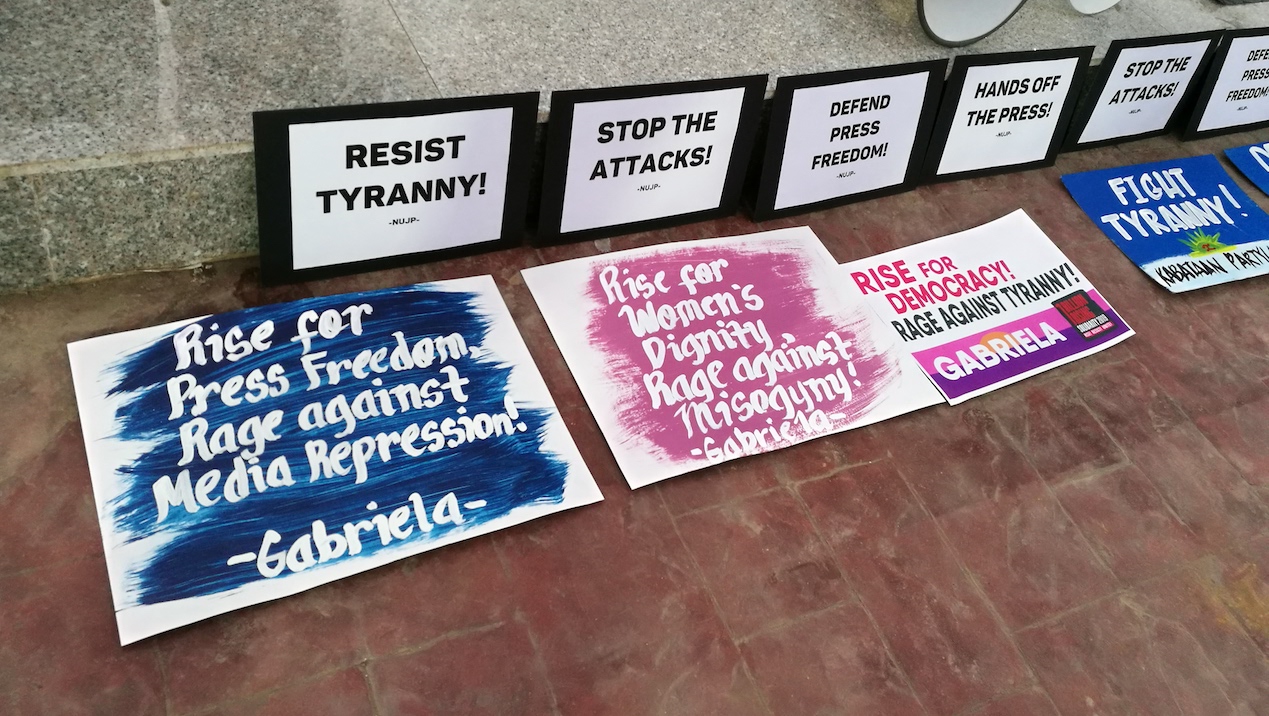The fake news provision in the Bayanihan To Heal As One Act
I cannot count the number of times misleading messages reach my group chats. If the sender is a friend or relative, I adhere to the golden rule of choosing to be kind over being right. Conveying the truth through a private message is the best remedy. But Filipinos need to scrutinize their posts before sharing or posting because of Section 6(f) of the Republic Act 11469 or the “Bayanihan To Heal As One Act.” The provision penalizes “fake news” or disinformation, under which reads:
“Individuals or groups creating, perpetrating, or spreading false information regarding the Covid-19 (coronavirus disease 2019) crisis on social media and other platforms, such information having no valid or beneficial effect on the population, and are clearly geared to promote chaos, panic, anarchy, fear, or confusion; and those participating in cyber incidents that make use or take advantage of the current crisis situation to prey on the public through scams, phishing, fraudulent emails, or other similar acts.”
As a digital rights advocate, the fake news provision is disturbing, as it might stifle the same rights we are fighting for. Using the term “fake news” doesn’t describe the complexity of misinformation (the inadvertent sharing of false information) and disinformation (the deliberate creation and sharing of information known to be false). The best way to fight disinformation is through education and the truth. I believe the provision threatens our constitutional rights to free expression and access to information. The statement, “Digital rights advocates demand the repeal of Section 6 of Bayanihan to Heal as One Act” on March 31, 2020, which I signed, encapsulates my opposition to this provision. False information is not defined in any existing law, so we leave its determination to the whims of law enforcers. The provision does not distinguish between those who like, share and comment, and those who deliberately generate false content or actively discuss pieces of information that are deemed false.
The National Union of Journalists of the Philippines (NUP) also released a statement on March 26, 2020 that the fake news provision threatens freedom and expression of the press. Section 6(f) seeks to punish people for an offense that, legally, does not even exist.
NUJP further adds that the “law will leave it up to the government, particularly to President Rodrigo Duterte, to be the arbiter of what is true or not, a prospect that cannot invite confidence given the fact that many administration officials, including the chief executive, have been sources of disinformation and misinformation.”
Though I want the government to repeal Section 6, particularly its provision on false information, it might not happen soon. Let’s take a quick pause before posting. Seek the help of our community and official sources to verify your posts. The Department of Health provides timely updates and infographics on Viber, Facebook and Twitter. It debunks a lot of fake news and disinformation on these channels.
Complaints on local government units (LGUs) are increasing and this is where the misinformation could start. LGUs could use its resources to generate, curate and disseminate critical pieces of information to the public and specific constituents towards addressing Covid-19 and supporting the needs of those most rendered vulnerable.
Being careful about sharing misinformation does not mean being silent. I am sure you have witnessed the positive impact of free speech and organizing over social media for the past weeks. Organizing fund drives and volunteer groups for medical equipment, food and transportation is all over social media platforms. We are gaining much headway in the battle against misinformation and contrived campaigns. More netizens are working from home and reaching out to win over those outside our echo chambers and even pushed back trolls.
Expressing our opinions on social media provided immediate results from officials in over 10 instances**. Trolls and the usual swarming techniques did not work for these officials. Just a few of these comprise: 1) Public concern over proposed power to take over corporations led to backtracking of the executive, with Congress restricting emergency powers; 2) A Negros Occidental governor recalled an order banning government hospital personnel from asking the public for personal protective equipment donations within a day because of social media outcry from doctors and their public; 3) The Health department drew flak from the public when they said it would pay volunteers P500 a day, so they are now considering its supplemental budget to increase the compensation.
Public opinion led to improvements in implementing the enhanced community quarantine.
Filipinos are not just fighting Covid-19 but also against fake news and incompetence.
Speaking up means praising those who have stepped up beyond the call of duty in these extraordinary times. Our concerted voices magnify the good and pushes our government to move in the right direction. I hope that the Section 6(f) provision will not be used to curtail free speech, and information critical of the government.
First published at Sunday Busines & IT on April 5, 2020.
**
Our collective voices have resulted in major PUSHBACKS.
1. The emergency powers given to Duts were clipped; also, some provisions for safeguards were added
2. Abuses of high government officials (like the Koko MMC incident) are widely condemned
3. Priority testing for VIPs was exposed and now reduced
4. RITM Director Dr. Carlos was fired by Duque at the behest of politicians; Duque forced to reinstate her due to public outcry
5. Requirement for health workers to show IDs at checkpoints was waived
6. Attempt by a POGO operator to convert a unit in a Mandaluyong condo to a workplace was blocked
7. Government was forced to provide transport to health workers and frontliners
8. Government pressured to declare ban on incoming China flights earlier than they planned to
9. Duts now forced to stay on script (fewer adlibs now); he can no longer get away with cursing or his sick sex jokes. People demand serious solutions now
10. AND… Bong Go has stopped saying “Sabi ni Presidente…” because really, nobody cares anymore what he has to say.
11.DOLE order limiting financial aid only to regular employees expanded to casual employees in govt and then the private sector, on prodding of unions and activists on social media
12.Negros Occidental governor recalled order banning govt hospital personnel from asking public for PPE donations within a day due to social media outcry from doctors and their public
13. QC City govt finally puts up special area for homeless and provides 24/7 care after outcry over the closure of private initiative to give them food and shelter.
(Numbers 1-10 was circulated in social media without need for attribution . Inday Varona contributed 11-13. )





